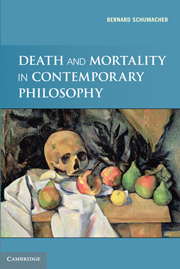Book contents
- Frontmatter
- Contents
- Preface
- Introduction
- Part One Human Personal Death
- Part Two Theory of Knowledge About Death
- 2 Scheler’s Intuitive Knowledge of Mortality
- 3 Heidegger’s Being-Towards-Death
- 4 Is Mortality the Object of Foreknowledge?
- 5 Inductive Knowledge of Death and Jean-Paul Sartre
- 6 Knowledge of Mortality Is Inseparable from the Relation to the Other
- 7 Death as the Object of Experience
- Part Three Does Death Mean Nothing To Us?
- Conclusion
- Bibliography
- Index of Names
- Index of Concepts
6 - Knowledge of Mortality Is Inseparable from the Relation to the Other
Published online by Cambridge University Press: 05 June 2012
- Frontmatter
- Contents
- Preface
- Introduction
- Part One Human Personal Death
- Part Two Theory of Knowledge About Death
- 2 Scheler’s Intuitive Knowledge of Mortality
- 3 Heidegger’s Being-Towards-Death
- 4 Is Mortality the Object of Foreknowledge?
- 5 Inductive Knowledge of Death and Jean-Paul Sartre
- 6 Knowledge of Mortality Is Inseparable from the Relation to the Other
- 7 Death as the Object of Experience
- Part Three Does Death Mean Nothing To Us?
- Conclusion
- Bibliography
- Index of Names
- Index of Concepts
Summary
Sartre is not the only contemporary philosopher in the first half of the twentieth century to insist that the experience of another’s death is necessary to arrive at a consciousness of the mortal condition of the human being. In his essay, The Experience of Death, Landsberg alludes to the axiom “The death of one’s neighbor is infinitely more than just the death of another” and speculates that the mere experience of the death of a person totally unrelated to me does not necessarily lead to experiential knowledge of the necessity of my death. The experience of the death of someone who is loved, rather, is what makes it possible for an “intuition of the necessity of death”, a certainty about our mortal condition, to arise; it also empowers me to transcend the generalizing dimension (“people die”) that submerges my death in the unconscious. “The awareness of the necessity of death is only provoked by participation, by the personal love in which the whole experience is bathed. We constituted a ‘we’ with the dying man. And it is through this ‘we’, through the very strength of this community, which constitutes as it were a new order of persons, that we are led to an experiential knowledge of our own mortality [de notre propre devoir mourir]”. The necessity of death is not yet identical in meaning to the statement that every human being must die but rather relates essentially to the persons whom I love and to myself. Landsberg explains that the general necessity of having to die that is communicated by this experience is not of a logical but of a “symbolic” nature. Our author states that “the other represents in reality all the others” and goes on to say that the other “is ‘Everyman’ and this Everyman dies each time in the death of the man we know, who dies his own death”. The experience of the death of a dear friend can lead me either to the consciousness that I must die or else to a “renewed consciousness” (“re-conscience”) of this necessity by tearing me away from the comfortable generalization “Everyone will die someday”. Landsberg explains that this experience allows the survivor to experience, thanks to the bond of love uniting two persons who make up a We (a theme that is developed quite well by Nozick), “death within his own existence” due to his loss and the interruption of the community that the survivor formed with the deceased. “The experience of death in the solitude that follows loss”, as well as the “sense of the tragic infidelity” in the departure of the deceased – Landsberg aptly describes mortality as the state of “ontological infidelity” – certainly teach the bereaved “the qualitative nature of absence and separation”, but it says nothing whatsoever about the experience of my death as a state. The experience of the death of a loved one does not enable me to experience the death in which the deceased “finds himself”, nor my own future death. The experience of death provided by the loneliness following a loss does not mean the experience of the state of death.
- Type
- Chapter
- Information
- Death and Mortality in Contemporary Philosophy , pp. 112 - 116Publisher: Cambridge University PressPrint publication year: 2010



